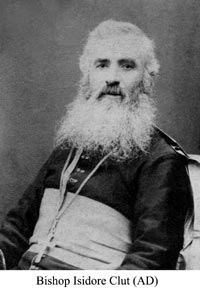Born: Saint-Rambert-d’Albon (Drôme), France, February 11, 1832
Took the habit: N.-D. de l’Osier, December 7, 1853
Vows: Montolivet, December 8, 1854 (No. 383)
Priestly ordination: Saint-Boniface, December 20, 1857
Episcopal ordination: Fort Chipewyan, August 15, 1857
Died: Saint-Bernard, Grouard, Alberta, July 9, 1903
Isidore Clut was born in Saint-Rambert-d’Albon, diocese of Valence, France, on February 11, 1832. His parents were Nicolas Clut, a farmer, and Élisabeth Guillermet. After his classical studies in the minor seminary of Valence, Isidore began his novitiate in Notre-Dame de l’Osier on December 7, 1853 and took vows in the presence of Father Tempier in Montolivet on December 8, 1854. At the beginning of his novitiate the novice master wrote: “[Clut] is an excellent candidate in every respect, robust health, very capable and his piety is both edifying and generous. A very vivacious character but his kindness and charity are admirable.” In his notes on the novices in the month of October 1854 he has more to say: This Brother seems to me to have made considerable progress in piety; I believe that he is now quite solid. He is talented and he has character; he is naturally grave and serious.”
Isidore Clut studied theology in the scholasticate of Montolivet, in Marseilles, from the end of 1854 until June 1857. Father Mouchette, moderator of scholastics, was rather severe in his judgements about him. In 1855 he emphazised that: “he is a character who is slow, lazy” and lacking in generosity. In 1856 he wrote: “he leaves much to be desired in the matter of regularity … not mortified, he tended to frequent those whom we have had to dismiss.”
At the beginning of 1857, Bishop de Mazenod had promised to send some missionaries to Red River. As they were about to depart, Father Jules Bouquillon became ill. The Founder sent the scholastic Clut in his place and he wrote to Bishop Taché on May 22: “I was really desperate. At the time I had nobody whom I could send to you. Then divine Providence inspired me to speak with the excellent Brother Clut of whose dedication I was aware. He is the perfect subject and he was overwhelmed with joy when I called him. He did not consider himself to be due for missions yet as he is not yet a sub-deacon and he still has one year of theology to do, but he is of mature age… I recommend that you do not delay to confer the priesthood on him. He is a solidly virtuous religious who will not neglect to finish his theological studies once he has been ordained priest. He is gifted with a good mind… You will be pleased with him. He will be a treasure for your mission.”
Missionary bishop
Having arrived in Saint-Boniface during the summer, he was ordained to the priesthood by Bishop Taché on September 20, 1857 and he left immediately for the mission of La Nativité in Fort Chipewyan, Alberta, where he remained until 1869. He also ministered to the mission of Fond-du-Lac, Athabaska.
Bishop Faraud suffered from severe rheumatic pains, which made travel difficult. In a document dated August 3, 1864, he obtained permission from the Holy See to choose an auxiliary. After consultation with his missionaries, he chose Father Clut and on August 15, 1857, he ordained him in Fort Chipewyan with the title of Bishop of Arindèle and auxiliary to the vicariate apostolic of Athabaska-Mackenzie. Bishop Clut held this position until 1903, with Bishop Faraud until 1890 and then with Bishop Emile Grouard from 1891 until 1903.
His residence was in Fort Providence in the periods 1870, 1875-1877, 1882-1884, in Fort Chipewyan, 1880-1881, in the mission of Saint-Bernard, 1881-1882 and it was there he continued to live from 1894 to 1903 as chaplain to the Sisters of Providence. It may well be said that Bishop Clut scarcely ever had a fixed residence. He spent all his life travelling and on apostolic journeys. It was not without good reason that he was known as “the bishop of suffering.” He visited the missions of the vicariate continually, especially Fond-du-Lac (1866, 1867, 1874), Hay River (1875, 1877), Fort Simpson (1871, 1872, 1875, 1886), Fort Nelson (1875). He even travelled as far as the Arctic Red River in 1874, to Alaska (1872-1873), to the Pacific island of Saint-Michel (1873). He took part in some of the sessions of the Vatican Council in 1869-1870. For health reasons and to collect funds, he travelled in Europe in 1877-1880, to Montreal in 1886, in France in 1887 and 1889.
Bishop Clut died on July 9, 1903. His death took place in the mission of Saint-Bernard, which today is called Grouard, Alberta. He was familiar with some of the Amerindian languages and he taught them to the missionaries. He composed part of the Dictionnaire Déné-Dindjié (Paris 1876) with Father Émile Petitot. In his report to the general chapter of 1904, Bishop Grouard expressed his regret at the death of his coadjutor and he added: “There is no need for me to sing the praises of Bishop Clut. His works speak eloquently of him. In the matters of piety, zeal, courage and self-denial, he was a worthy disciple of Bishops Taché, Faraud, Durieu and Grandin.” (Missions OMI, 43 (1905), p. 103).
Yvon Beaudoin
and Gaston Carrière, o.m.i.

